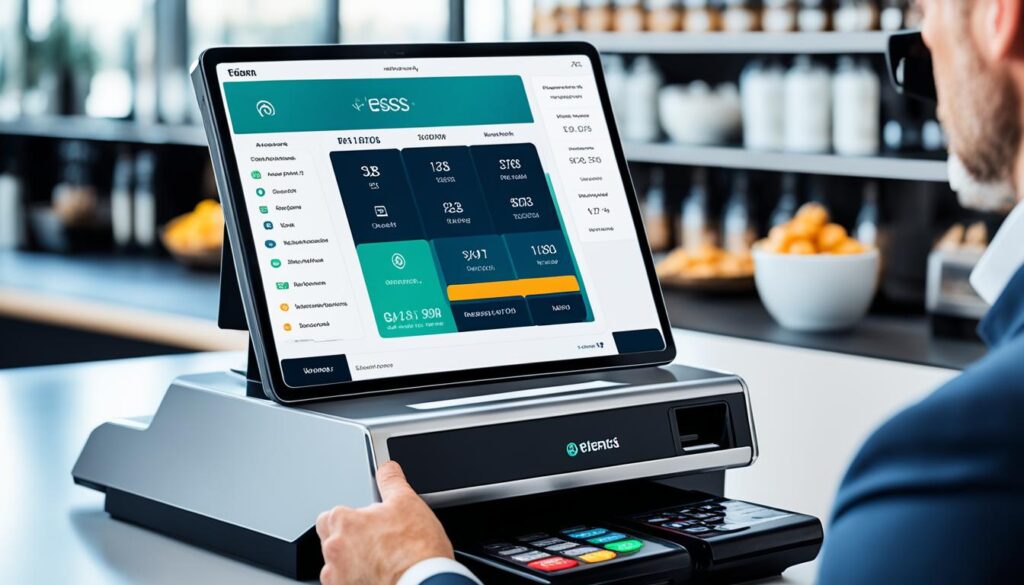Did you realize that small businesses in the United States make up 99.9% of all businesses in the country? This statistic is truly remarkable, highlighting the important role that small businesses play in driving the economy and providing unique products and services to customers.
In today’s digital age, accepting electronic payments has become essential for small businesses to thrive. That’s where merchant services for small businesses come into play. These services offer a range of features that enable businesses to process card transactions seamlessly, both in-person and online.
From competitive processing fees to a variety of payment types and integration with popular business apps, the best small business merchant services provide fast and reliable solutions to help businesses grow and succeed.
Key Takeaways:
- Small businesses are a critical driver of the U.S. economy, accounting for 99.9% of all businesses.
- Merchant services for small businesses enable the seamless processing of card transactions, both in-person and online.
- The best small business merchant services offer competitive processing fees, accept various payment types, and integrate with popular business apps.
- Accepting electronic payments can help small businesses attract more customers, increase revenue, and streamline their payment processing workflow.
- Choosing the right merchant services provider involves considering factors such as pricing, integration capabilities, customer support, and security measures.
Our Top Picks for Small Business Merchant Services
When it comes to finding the best merchant services for your small business, there are several providers that stand out from the rest. These top picks offer a range of features, competitive pricing, and reliable service to help streamline your payment processing. Whether you’re looking for transparent pricing, flexible plans, or integration with popular business apps, these merchant services have got you covered.
Helcim
Helcim is a top choice for small businesses due to its transparent pricing, lack of monthly fees, and volume discounts. With Helcim, you can process card transactions without worrying about hidden costs or surprise fees.
Square
If you’re looking for flat-rate pricing with no monthly fees and low transaction rates, Square is the best option for you. Square’s user-friendly interface and seamless integration with its point-of-sale (POS) system make it a popular choice among small businesses.
Stripe
Stripe specializes in online sales and supports processing payments in multiple currencies. With Stripe, you can easily expand your business globally and provide a secure payment experience for your international customers.
National Processing
National Processing offers different plans based on whether you’re accepting payments in-person or online. They also provide a free terminal for new merchants, making it a cost-effective solution for small businesses.
Payment Depot
Payment Depot offers membership plans that give businesses access to wholesale interchange rates at a set monthly fee. This can significantly reduce your processing costs and increase your bottom line.
U.S. Bank Merchant Services
U.S. Bank offers a comprehensive suite of services, including business banking, payment processing, and point-of-sale solutions. Their Everyday Funding feature ensures daily deposits, helping you manage your cash flow efficiently.
Chase Payment Solutions
Chase Payment Solutions is a direct processor that offers fast deposits and operates as both the payment processor and acquiring bank. Their robust infrastructure ensures secure and reliable payment processing for your small business.
PaymentCloud
PaymentCloud specializes in providing services for high-risk industries and offers tools for chargeback prevention. If your business operates in a high-risk industry, PaymentCloud can help you navigate the challenges and minimize risks.
Dharma Merchant Services
Dharma Merchant Services stands out for its low processing rates and pricing transparency. They also offer reduced rates for large monthly processing volume, making it an attractive option for growing businesses.
QuickBooks Payments
For QuickBooks users, QuickBooks Payments is the best choice as it seamlessly integrates with the accounting software. This integration saves you time by automatically syncing your payment data with your accounting records.
These top merchant services providers offer a range of features and benefits that cater to the needs of small businesses. Whether you prioritize transparent pricing, flexibility, security, or seamless integration, there’s a merchant service provider on this list that can help take your business to the next level.
How We Chose the Best Small Business Merchant Services
When selecting the best small business merchant services, we conducted a thorough evaluation based on several key criteria. Our team considered factors such as pricing, customer support, integrations, and features to determine the top picks for merchant services. In order to provide an unbiased assessment, we analyzed over 30 options across 22 data points, taking into account real customer feedback and experiences. Each merchant service provider on our list offers unique benefits and caters to different business needs.
Here is a breakdown of the criteria we used to choose the best small business merchant services:
- Pricing: We assessed the processing fees, monthly fees, and any additional charges associated with each merchant service provider. Transparent and competitive pricing was a significant factor in our evaluation.
- Customer Support: We evaluated the level of customer support offered by each provider. Reliable support options such as phone, email, and live chat were considered essential.
- Integrations: We examined the compatibility and integration capabilities of each merchant service provider with various business systems and software. Seamless integration with popular tools and applications was highly valued.
- Features: We analyzed the range of features and functionalities offered by each provider. Whether it was fraud detection, analytics, or mobile payment options, we considered the value these features brought to small businesses.
By carefully assessing these criteria, we were able to identify the best small business merchant services that successfully met the needs of different businesses across various industries. The following table presents our top picks and highlights their standout features:
| Merchant Service Provider | Key Features |
|---|---|
| Helcim | Transparent pricing, lack of monthly fees, and volume discounts |
| Square | Flat-rate pricing, no monthly fees, and low transaction rates |
| Stripe | Support for online sales and processing payments in multiple currencies |
| National Processing | Different plans for in-person and online payments, plus a free terminal for new merchants |
| Payment Depot | Access to wholesale interchange rates through membership plans at a set monthly fee |
Note: The above table represents only a few examples and does not encompass all the merchant services we evaluated. For a complete list of our top picks and a detailed analysis of each provider, please refer to our comprehensive guide on choosing the best small business merchant services.
The Benefits of Small Business Merchant Services
Small business merchant services offer numerous advantages that can help businesses grow and thrive in today’s competitive market. By leveraging these services, businesses can enhance their revenue, streamline payment processes, and provide a secure and convenient experience for their customers.
Here are some key benefits of small business merchant services:
- Increased revenue: Accepting card payments can significantly boost sales and attract more customers. By offering convenient payment options, businesses can cater to a wider range of customers and increase their chances of making a sale.
- Convenience: Customers are increasingly relying on cards for their purchases, making it easier and more convenient for them to complete transactions. Small business merchant services enable businesses to accept various payment methods, including credit and debit cards, mobile payments, and online payments.
- Security: Merchant services providers prioritize the security of customer data by implementing robust encryption and other security measures. This ensures that sensitive information is protected from unauthorized access or fraudulent activity.
- Efficiency: Streamlined payment processing through merchant services saves time and reduces manual errors compared to traditional payment methods. Businesses can enjoy faster transaction times and a smoother overall payment workflow, allowing them to focus on other aspects of their operations.
- Integration: Many small business merchant services seamlessly integrate with popular business apps, accounting software, and point-of-sale (POS) systems. This integration simplifies administrative tasks, such as inventory management, sales tracking, and financial reporting.
- Customization: Small business merchant services can be tailored to meet the specific needs of different businesses. Whether it’s setting up recurring billing, implementing loyalty programs, or enabling online invoicing, these services offer flexibility and scalability to accommodate growth and evolving business requirements.
Overall, small business merchant services provide invaluable support to businesses by enabling electronic payment acceptance, ensuring data security, and enhancing operational efficiency. By leveraging the benefits of merchant services, businesses can optimize their sales processes, improve customer satisfaction, and accelerate their growth.

Factors to Consider When Choosing Small Business Merchant Services
When selecting the right small business merchant services, it’s crucial to consider various factors to ensure the best fit for your business needs. This section highlights key considerations that will help you make an informed decision.
Pricing
Evaluate the pricing structure of merchant service providers. Take into account processing fees, monthly fees, and any additional charges that may apply. It’s important to find a provider that offers competitive pricing without compromising on the quality of service.
Payment Types
Ensure that the merchant services provider supports a wide range of payment types. This includes commonly used methods such as credit cards and debit cards, as well as emerging payment options like mobile payments. Offering diverse payment options enhances convenience for your customers and increases your sales potential.
Integration
Check if the merchant services integrate seamlessly with your existing business systems and software. Integration allows for efficient and streamlined operations, enabling data synchronization across different platforms. Look for providers that offer compatibility with popular point-of-sale (POS) systems, accounting software, and e-commerce platforms.
Customer Support
Reliable customer support is vital when choosing a merchant services provider. Look for options that offer multiple channels of support, such as phone, email, and live chat. Prompt and knowledgeable support ensures that any issues or concerns you encounter can be resolved swiftly, minimizing disruptions to your business operations.
Security
Data security is a critical factor to consider when selecting merchant services. Ensure that the provider implements robust security measures to protect sensitive customer data. Look for features such as encryption, tokenization, and fraud detection tools to safeguard against potential threats. A secure payment processing solution instills trust in your customers and protects your business reputation.
Scalability
Consider the scalability of the merchant services. As your business grows and evolves, your payment processing needs may change. Choose a provider that can accommodate your expansion plans, whether it’s supporting higher transaction volumes, introducing new payment methods, or adapting to changing business models.
By carefully considering these factors, you can choose a small business merchant services provider that aligns with your specific needs and goals, empowering your business with efficient and reliable payment processing capabilities.
How to Apply for Small Business Merchant Services
If you’re ready to start accepting electronic payments for your small business, applying for merchant services is a straightforward process. Follow these steps to get started:
- Gather the necessary documentation: Before applying, make sure you have the required documentation ready. This may include financial statements, business licenses, and processing statements.
- Research different merchant service providers: Take the time to research and compare different merchant service providers to find the best fit for your business. Consider factors such as pricing, features, customer support, and integrations.
- Complete the application: Once you’ve selected a provider, you can either complete the online application or reach out to the provider directly to start the application process.
- Provide the required information and documentation: During the application process, you’ll need to provide the necessary information and documentation as requested by the provider. This may include details about your business, financial information, and proof of identity.
- Wait for the provider’s review: After submitting your application, the provider will review it to determine whether or not to approve your merchant account. The review process may take some time, so be patient during this stage.
- Set up payment processing equipment: Once your application is approved, you’ll need to set up the necessary payment processing equipment. This may involve installing a point-of-sale (POS) system, integrating payment gateways into your website, or configuring mobile payment solutions.
By following these steps, you’ll be on your way to accepting electronic payments and providing a seamless payment experience for your customers.

Tips for Choosing the Right Small Business Merchant Services
When it comes to selecting small business merchant services, there are several factors to consider to ensure you make the right choice for your business needs. Here are some valuable tips to help you in the decision-making process:
Assess your business needs: Before diving into the options available, take the time to evaluate your business requirements and determine which features are most important to you. This will help you focus on finding a provider that can meet your specific needs.
Compare pricing and fees: Pricing is a crucial factor in selecting merchant services. Compare the fees and rates of different providers to find the most cost-effective option for your business. Pay attention to any hidden fees or long-term contracts that may impact your budget.
Read customer reviews and ratings: Get insights into the reputation and customer satisfaction of merchant service providers by reading customer reviews and ratings. This feedback can provide valuable information about the quality of service and support offered by different providers.
Look for transparent pricing: Transparency is essential when choosing merchant services. Seek out providers that offer clear and transparent pricing, ensuring there are no hidden fees or surprises down the line. Avoid long-term contracts that may limit your flexibility.
Consider customer support: The level of customer support offered by a merchant service provider is essential, especially when issues arise. Evaluate the available support options, such as phone, email, and live chat, and ensure they align with your business hours and needs.
Evaluate security measures: Protecting customer data is crucial in today’s digital landscape. Evaluate the security measures implemented by different providers and ensure they meet industry standards for safeguarding sensitive information.
By considering these tips, you can make an informed decision when choosing small business merchant services that best align with your business goals and priorities.
The Future of Small Business Merchant Services
The future of small business merchant services is evolving with advancements in technology and changing consumer preferences. As digitalization continues to reshape the business landscape, merchant service providers are adapting to meet the needs of small businesses in a rapidly evolving marketplace.
Here are some emerging trends that are shaping the future of small business merchant services:
Contactless Payments
Contactless payments have gained significant traction in recent years. With the rise of mobile wallets and contactless payment methods, businesses are adopting these technologies to enhance convenience and speed up transactions. The ability to accept contactless payments not only improves the customer experience but also aligns with the growing preference for touchless interactions.
Online and Mobile Shopping
The shift towards online and mobile shopping has been accelerated by changing consumer behaviors, and merchant service providers are focusing on optimizing the online and mobile shopping experience. Seamless integration with e-commerce platforms and mobile payment solutions enables small businesses to tap into the growing market of online shoppers and deliver a frictionless shopping experience.
Data Analytics
Merchant service providers are increasingly leveraging data analytics to provide insights into consumer behavior, preferences, and trends. By analyzing transaction data, businesses can make data-driven decisions and tailor their offerings to better meet customer demands. Data analytics also helps in identifying opportunities for growth and optimizing business operations.
Integration with Business Apps
Seamless integration with popular business apps, such as accounting software, inventory management systems, and customer relationship management (CRM) platforms, has become essential for small businesses. By connecting merchant services with these business apps, businesses can streamline their operations, automate processes, and gain better visibility into their financials.
Enhanced Security
With the increase in cybersecurity threats, merchant service providers are investing in advanced security measures to protect customer data and prevent fraud. Strong encryption protocols, tokenization, and multi-factor authentication are becoming standard practices to ensure the security of transactions and build customer trust.
As the future unfolds, small business merchant services will continue to evolve to meet the changing needs of businesses and consumers. By embracing these emerging trends, small businesses can position themselves for success in an increasingly digital and competitive marketplace.

In the next section, we will explore the common challenges that small businesses may face when using merchant services and provide tips on how to overcome them.
Common Challenges with Small Business Merchant Services
Small business merchant services play a crucial role in enabling businesses to accept electronic payments and streamline their payment processing. However, they are not without their challenges. Let’s take a closer look at some of the difficulties that small businesses may encounter when utilizing merchant services:
-
Processing Fees: For small businesses with low transaction volumes, processing fees can be a significant expense that affects their bottom line. These fees can eat into profits and hinder growth opportunities.
-
Integration Issues: Integrating merchant services with existing business systems and software can sometimes be complex and time-consuming. Businesses may face compatibility issues or require technical expertise to ensure a seamless integration.
-
Security Concerns: With the growing threat of cyber attacks, small businesses need to prioritize security when selecting a merchant services provider. Ensuring that the provider has robust security measures in place to protect customer data is vital for maintaining trust and avoiding potential breaches.
-
Limited Support: Some merchant service providers may have limited customer support options, which can be frustrating for small businesses when they encounter issues or have questions. Reliable and accessible customer support is essential for resolving any problems that arise in a timely manner.
-
Changing Technology: As technology continues to evolve, keeping up with advancements in payment technology and ensuring compatibility with new devices and platforms can be challenging for small businesses. Staying abreast of the latest trends and ensuring their merchant services can adapt to these changes is crucial for maintaining a competitive edge.
While these challenges may pose difficulties for small businesses, they can be overcome with careful consideration, research, and choosing the right merchant services provider. By addressing these challenges proactively, businesses can maximize the benefits of small business merchant services and provide a seamless payment experience for their customers.

| Challenges | Description |
|---|---|
| Processing Fees | Significant expense for small businesses with low transaction volumes |
| Integration Issues | Complex and time-consuming integration with existing business systems and software |
| Security Concerns | Growing threat of cyber attacks and the need for robust security measures |
| Limited Support | Providers with limited customer support options |
| Changing Technology | Keeping up with advancements in payment technology and ensuring compatibility |
The Importance of Small Business Merchant Services
Merchant services play a crucial role in the success of small businesses. They enable businesses to accept electronic payments, provide a secure and convenient payment experience for customers, and help streamline the payment processing workflow. Merchant services also offer additional features, such as integration with business apps, data analytics, and fraud detection, which can benefit small businesses in managing their operations and driving growth. By accepting electronic payments, businesses can expand their customer base, improve efficiency, and enhance the overall customer experience.
One of the key benefits of small business merchant services is the ability to accept electronic payments. In today’s digital age, more and more customers prefer using cards or mobile payment solutions over cash. By offering these payment options, small businesses open themselves up to a larger customer base and can capture sales that they might otherwise miss out on.
Moreover, merchant services provide a secure and convenient payment experience for customers. With robust encryption and fraud prevention measures in place, customers can feel confident that their sensitive financial information is protected. Additionally, accepting electronic payments eliminates the need for customers to carry cash or write checks, making the checkout process faster and more efficient.
Small business merchant services also streamline the payment processing workflow. By automating payment acceptance and reconciliation, businesses can save time and reduce the risk of errors that can occur with manual processing. This allows business owners to focus on other critical aspects of their operations and ensures a smooth and seamless payment experience for both customers and staff.
Furthermore, merchant services offer additional features that can help small businesses manage their operations and drive growth. Integration with business apps, such as accounting software and inventory management systems, allows for seamless data flow and simplifies business processes. Data analytics tools provided by merchant service providers enable businesses to gain insights into customer behavior, sales trends, and other valuable metrics, empowering them to make data-driven decisions and optimize their strategies.
Lastly, merchant services play a vital role in fraud detection and prevention. Many providers offer advanced security measures, such as real-time transaction monitoring and chargeback prevention tools, to protect businesses and their customers from fraudulent activities. By safeguarding against fraud, small businesses can maintain their reputation, build trust with customers, and avoid potentially devastating financial losses.
Overall, the importance of small business merchant services cannot be overstated. From providing the ability to accept electronic payments to offering secure transactions, streamlining workflow, providing valuable insights, and combating fraud, merchant services empower small businesses to thrive in an increasingly digital and competitive landscape.
| Benefits of Small Business Merchant Services |
|---|
| Expanded customer base |
| Secure and convenient payment experience |
| Streamlined payment processing workflow |
| Integration with business apps |
| Data analytics and insights |
| Fraud detection and prevention |
With these benefits in mind, small businesses should carefully consider implementing merchant services to unlock their full potential and stay ahead in today’s fast-paced digital economy.

Conclusion
Small business merchant services are an essential tool for businesses looking to accept electronic payments and streamline their payment processing. With a wide range of providers to choose from, it is crucial to consider various factors such as pricing, integration capabilities, customer support, and security measures.
By selecting the right merchant services for your business, you can enhance your revenue by accepting a variety of payment types, improve efficiency by streamlining your payment processing workflow, and provide a seamless payment experience for your customers.
Whether you are a retail store, restaurant, or e-commerce business, small business merchant services offer numerous benefits, including increased convenience for your customers, data analytics to help you make informed business decisions, and integration with popular business apps to enhance productivity.
To make the most of small business merchant services, carefully evaluate your business needs and priorities, compare different providers, and choose the one that best aligns with your goals and requirements. By doing so, you can effectively manage your payment processing, boost customer satisfaction, and drive the growth of your business.
FAQ
What are merchant services for small businesses?
What are the best merchant services for small businesses?
What are the benefits of small business merchant services?
What factors should I consider when choosing small business merchant services?
How do I apply for small business merchant services?
What tips should I consider when choosing small business merchant services?
What is the future of small business merchant services?
What are the common challenges with small business merchant services?
Why are small business merchant services important?
How Can Small Business Merchant Services Ensure Secure Transactions?
Small business merchant services can ensure secure transactions by utilizing reliable secure payment gateway services. These services provide an extra layer of security to protect sensitive customer data during every transaction. By implementing secure payment gateway services, businesses can build trust and confidence with their customers while safeguarding their financial information.









